The Civil Rights Act of 1957 was a game-changer in America’s ongoing struggle for civil rights. As the first major piece of civil rights legislation since Reconstruction, it aimed to make life better for Black Americans and tear down the oppressive Jim Crow laws. Coming at a time of intense racial tension, this Act offered a ray of hope and set the stage for future advances in the fight for equality. It wasn’t the final step, but it was a significant move toward making America a fairer place for everyone.

✅ AI Essay Writer ✅ AI Detector ✅ Plagchecker ✅ Paraphraser
✅ Summarizer ✅ Citation Generator
The Genesis of the Civil Rights Act of 1957
The roots of the Civil Rights Act can be traced back to the expanding Civil Rights Movement, which gained momentum in the early 1950s. This period was characterized by an increasing awareness among Black Americans of their rights and a growing determination to challenge Jim Crow laws. The movement sought to overturn decades of segregation and discrimination, preparing the ground for a legislative response.
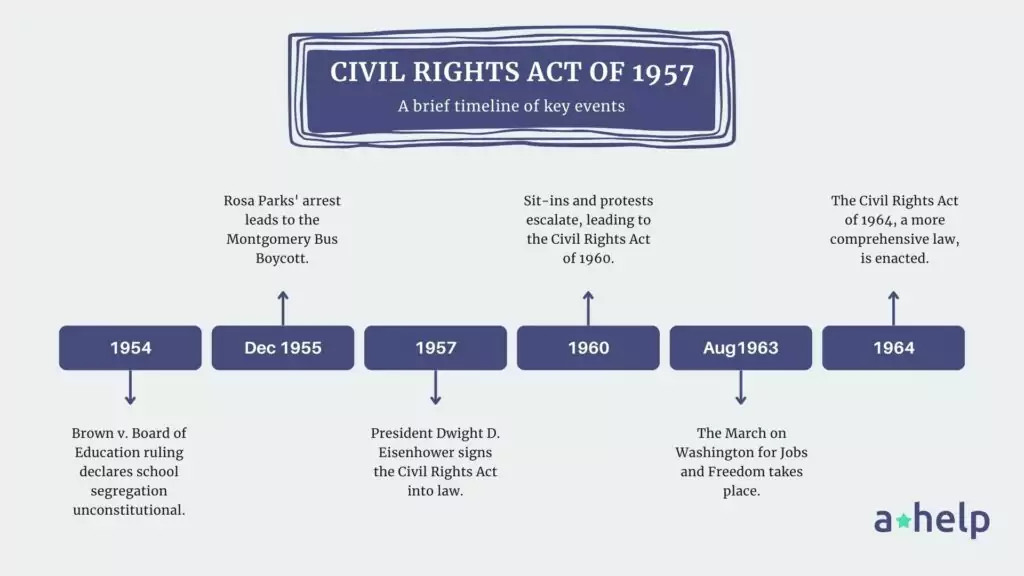
World War II and Civil Rights
World War II really shook things up for the Civil Rights Movement in the United States. Think about it—here was a war being fought for freedom and democracy, yet back home, these same ideals weren’t available to Black Americans due to racial segregation and discrimination. More than a million African Americans served during the war, both in the States and overseas, battling not only enemies from other countries but also racism within their own ranks.
Their service had a deep impact. Many Black soldiers experienced different racial attitudes while abroad and realized that the segregation they faced at home wasn’t a global norm. When they returned, they brought with them a new determination not to settle back into second-class citizenship. They were ready to challenge the status quo.
This change in mindset became a key driver for the Civil Rights Movement. The stark contrast between fighting for freedom abroad and being denied basic rights at home became a powerful argument for civil rights advocates. They used this contradiction to push for the end of segregation and the establishment of equal rights. This era also saw the rise of new civil rights organizations and the strengthening of existing ones, paving the way for the major civil rights campaigns of the 1950s and 1960s. World War II, therefore, was also a turning point in the domestic fight for racial equality in the U.S., shaping the Civil Rights Movement for years to come.
Impact on American Society
The Civil Rights Act of 1957, while limited in its scope, marked a monumental shift in American society and its legal landscape. It was the first piece of federal civil rights legislation enacted since the Reconstruction era, representing a significant breakthrough in the long struggle for racial equality. The act primarily targeted the protection and enforcement of voting rights for Black Americans, addressing one of the fundamental injustices supported by the Jim Crow laws.
This legislation became a symbolic gesture of great importance, signaling a change in the federal government’s stance on civil rights issues. By asserting its role in protecting the rights of African American citizens, the act challenged the prevailing norms of segregation and discrimination. Its passage encouraged further activism and set the stage for more comprehensive civil rights legislation in the 1960s. The Civil Rights Act of 1957 thus not only impacted the legal rights of Black Americans but also catalyzed a broader cultural and societal shift toward greater equality and justice in the United States.
Key Figures in the Civil Rights Movement
A diverse group of leaders pioneered the Civil Rights Movement, each contributing uniquely to the struggle for equality. These individuals fought against the injustices of their time and left an indelible mark on history.
Rosa Parks
Rosa Parks is often remembered as the “mother of the civil rights movement.” Her refusal to give up her seat to a white passenger on a Montgomery, Alabama bus in 1955 became a powerful symbol of resistance against racial segregation. This act of defiance led to the Montgomery Bus Boycott, a 381-day mass protest that ended with the U.S. Supreme Court ruling that segregation on public buses was unconstitutional. Parks’ quiet strength and unwavering resolve inspired a generation to stand up against racial injustice, making her one of the most iconic figures in the Civil Rights Movement.
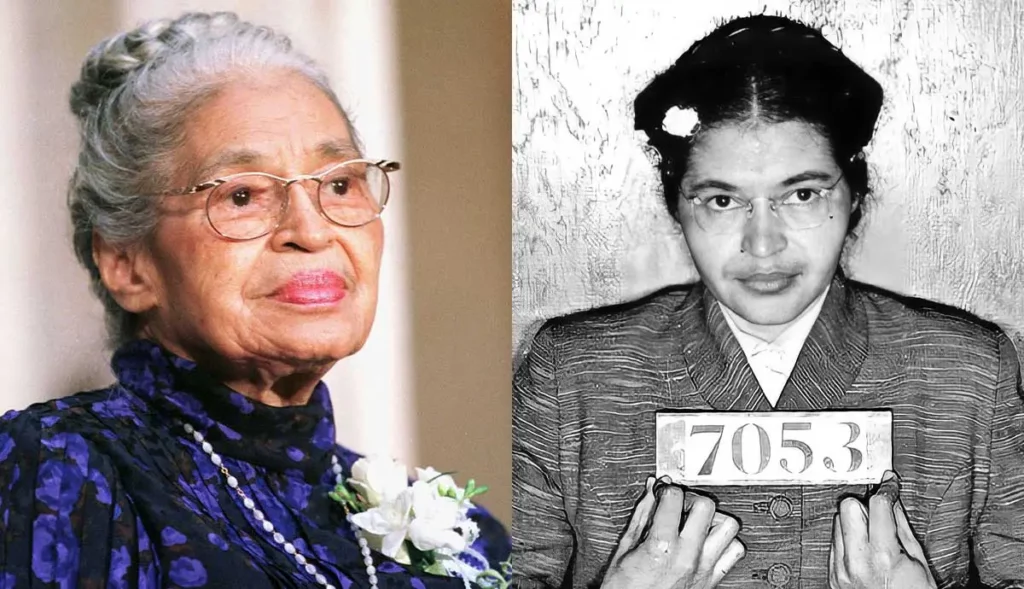
Martin Luther King Jr.
Dr. Martin Luther King Jr. is undoubtedly one of the most renowned leaders of the Civil Rights Movement. A Baptist minister and social activist, King advocated for nonviolent resistance to overcome racial discrimination. His leadership during pivotal events like the Montgomery Bus Boycott and the March on Washington, where he delivered his famous “I Have a Dream” speech, significantly influenced the national agenda. King’s ability to articulate the deep-seated grievances and aspirations of African Americans played an important role in the passage of civil rights legislation, including the Civil Rights Act of 1957 and 1964.
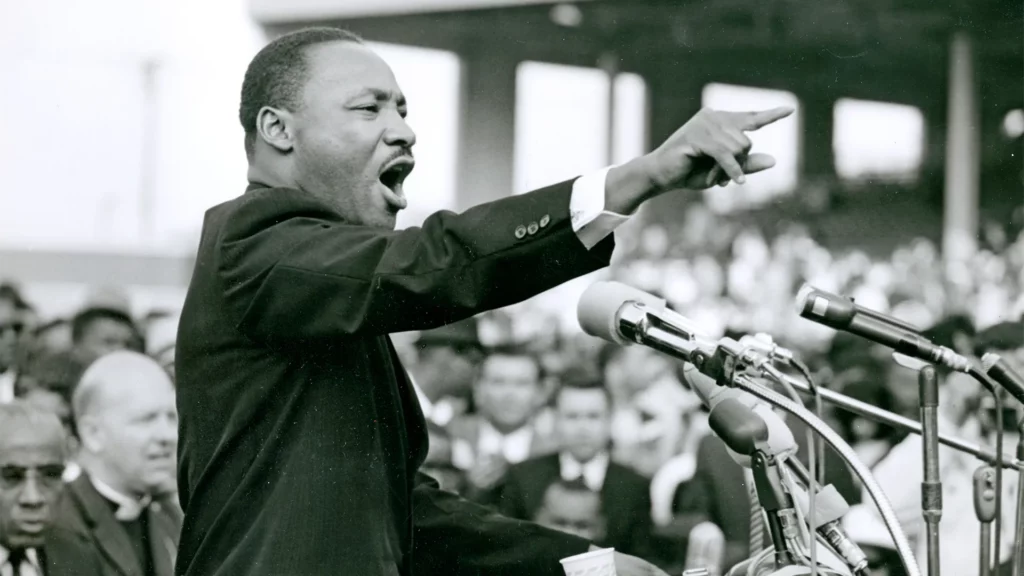
John Lewis
John Lewis, a key figure in the Civil Rights Movement, is best known for his role in leading the Freedom Riders and for being one of the “Big Six” leaders who organized the 1963 March on Washington. A staunch advocate of nonviolent protest, Lewis faced brutal physical attacks while challenging the injustice of Jim Crow laws in the South. His dedication to fighting for voting rights led to his prominent role in the Selma to Montgomery marches, particularly the event known as “Bloody Sunday.” Lewis’ lifelong commitment to civil rights and public service continued until his death in 2020, making him a symbol of enduring courage and resilience.
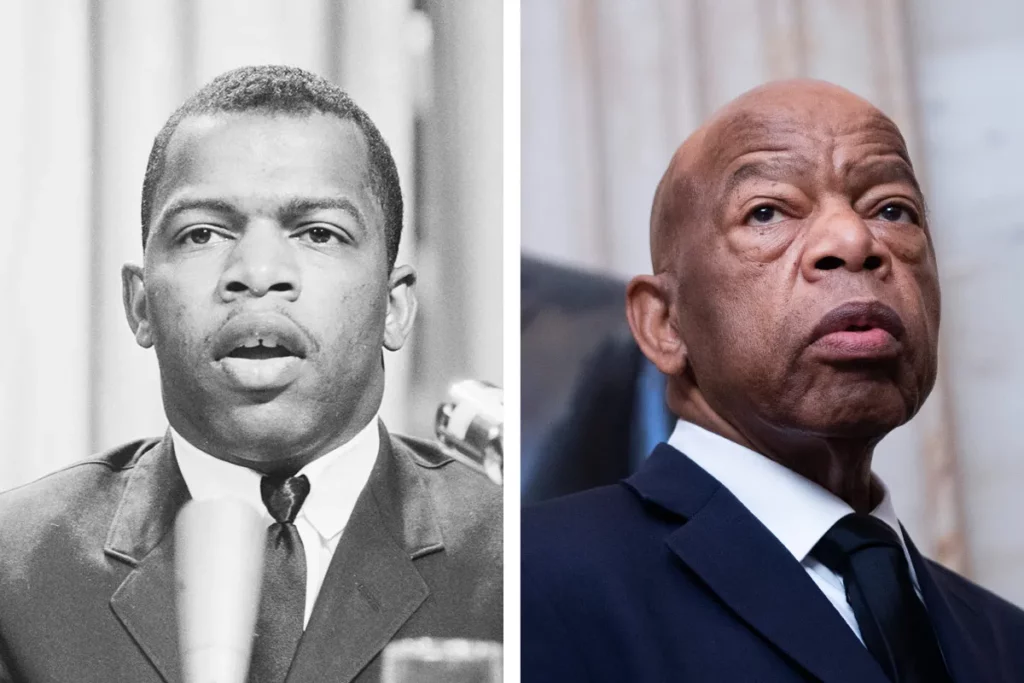
Malcolm X
Malcolm X, a prominent and controversial figure in the Civil Rights Movement, advocated for Black empowerment and the rejection of racial integration as championed by mainstream civil rights leaders. As a spokesperson for the Nation of Islam, his views initially contrasted sharply with those of Martin Luther King Jr., emphasizing self-defense in response to racial oppression. However, his pilgrimage to Mecca led to a transformation in his approach, softening his stance and advocating for a more inclusive fight against racial injustice. Malcolm X’s articulate, passionate advocacy for Black dignity and self-reliance left a lasting impact on the movement and continues to influence discussions on racial equality.

Thurgood Marshall
Thurgood Marshall, a lesser-known but equally significant figure, was instrumental in the legal battles against racial discrimination. Before becoming the first African American Supreme Court Justice, Marshall was a leading lawyer for the NAACP. His most notable achievement was arguing the landmark case Brown v. Board of Education in 1954, which led to the desegregation of public schools. Marshall’s legal acumen and dedication to equality under the law played an important role in dismantling institutionalized racism and paved the way for future civil rights advancements.
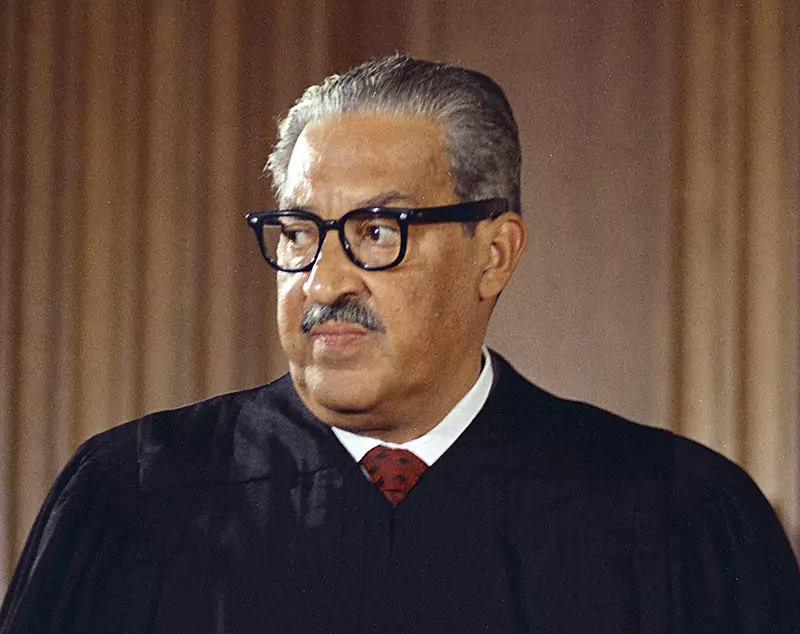
The Civil Rights Act of 1957 was and still is a symbol of progress and proof of the relentless struggle of civil rights leaders and ordinary citizens alike. While it did not immediately take the Jim Crow laws apart or eradicate racial discrimination, it set a precedent for future civil rights legislation and marked a significant step forward in the journey toward equality and justice in America.
FAQ
Follow us on Reddit for more insights and updates.





Comments (0)
Welcome to A*Help comments!
We’re all about debate and discussion at A*Help.
We value the diverse opinions of users, so you may find points of view that you don’t agree with. And that’s cool. However, there are certain things we’re not OK with: attempts to manipulate our data in any way, for example, or the posting of discriminative, offensive, hateful, or disparaging material.